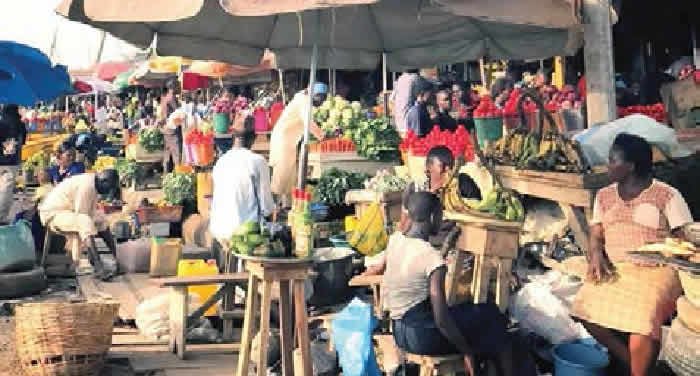
Food prices in Nigeria have soared in recent times due to many factors affecting the country ranging from insecurity, inflation among others.
Many countries of the world are facing an increase in food prices ignited by the coronavirus outbreak and lockdowns which affected firms, manufacturers and farmers.
Also, the war between Russia and Ukraine plunged the world into a food crisis as the region is one of the highest exporters of staple food. These factors and the security challenges plaguing Nigeria have resulted in the increase in food prices in recent times.
In a report by the National Bureau of Statistics, the agency noted that food prices have soared especially in July 2022. This was contained in the Selected Food Prices Watch Report for July 2022 released in Abuja on Monday.
The NBS stated that the average price of 1kg of white beans rose by 23.22 per cent from N444.21 in July 2021 to N547.38 in July 2022.
“On a month-on-month basis, the price increased by 2.09 per cent from N536.17 in June 2022 to N547.38 in July 2022.’’ It added.
The report stated also that the average price of 1kg of tomatoes increased on a year-on-year basis by 7.71 per cent from N414.83 in July 2021 to N446.81 in July 2022.
The average price of 1kg beef (boneless) in July 2022 was N2,118.84, an increase of 27.58 per cent from the N1,660.76 recorded in July 2021.
The NBS also stated that the average price of a bottle of groundnut oil stood at N1,078.17 in July 2022, showing an increase of 40.24 per cent from N768.81 in July 2021.
Similarly, in a report by Trading Economics, the Food Price Index in the World averaged 85.09 Index Points from 1990 until 2022, reaching an all-time high of 159.70 Index Points in March of 2022.
Earlier, data from the NBS in April 2021, noted that the country’s inflation rate was at 18.12 per cent, it reduced to 17.93 per cent in May 2021. The data stated that in March 2021, the food inflation rate rose to 22.95 per cent from 21.79 per cent in February 2021. However, May 2022 data from the NBS showed that Nigeria’s inflation rate increased to 17.7 per cent.
Earlier, in a report by the United Nations Food and Agriculture Organisation, it was noted that 19.4 million people would face food insecurity across Nigeria between June and August 2022.
The report analysed acute food and nutrition insecurity in the Sahel and West African region before drawing the conclusion. It was a collaborative work with the Federal Ministry of Agriculture and Rural Development and other stakeholders.
The report said that the food crisis would affect Nigerians in 21 states and FCT, including 416,000 Internally Displaced Persons.
It noted that about 14.4 million people, including 385,000 IDPs in 21 states and FCT of Nigeria, were already in the food crisis till May 2022.
Also, the UN FAO in 2021 stated that at least 9.2 million people in Nigeria faced a crisis or worse levels of food insecurity between March and May amid armed conflicts, COVID-19 effects and climate change.
Of these, an estimated 3.2 million were in Adamawa, Borno and Yobe states, the FAO said in a statement. All of these contributed to the recent increase in food prices across Nigeria.
However, despite the promise by the President, Major Gen. Muhammadu Buhari (retd.) in January that food prices would reduce and become more affordable, available data showed otherwise.
Meanwhile, to ascertain food security, the Lagos State Government inaugurated the largest Food Security Systems and Central Logistics Park in sub-Saharan Africa.
The food park is part of Lagos State five-year Agricultural and Food Systems Road Map (2021–2025) launched last year by the state government to enhance food security in the state.
Upon completion, the hub is expected to create direct wealth for more than five million traders in the agricultural value chain, and guarantee supply of food to more than 10 million Lagosians for at least 90 days during scarcity.
The food and logistics hub will also have storage facilities for more than 1,500 trucks that will service thousands of operators daily within the food value chain.
The state government also planned to boost the food market by N5tn through the hub. This development from the Lagos State government was hailed by experts, who also urged other states to replicate the same.
Commenting on the development, a former Chairman, Agric Group, Lagos Chamber of Commerce and Industry, AfricanFarmer Mogaji, explained that other states of the country might be unable to adopt what Lagos State did due to differences in their internally generated revenue.
He said, “These states might be unable to do this because most of them run the civil servants economy. However, due to the fact that the states produce food in economic quantities, they can collaborate for sustainability. Most of these states do not have the mindset Lagos State has and it might not be sustainable if they decide to do it alone.
“Lagos State cannot produce what it consumes and due to this, the state can pay cash to other states for their own agric produce and they in turn use the cash for feeding. Lagos can absolutely influence states by telling them that for every cash we pay, you use the money into feeding to produce more, then this will make farmers more economically progressive.’’
He noted that many of the states should leverage what they have and also use that to their advantage especially in what they produce.
He stated, “Each state should be concerned about how to ensure food security by appropriately converting their waste. About 40 per cent of everything produced by the states go to waste. They should be concerned about value addition by directing those products meant to waste away into other products.”
He also noted plantains wasting away in Osun, Ekiti, Ondo and Edo states could be reproduced into plantain flour which is higher in iron and could be sold to Lagos State. He noted that yams wasting away in Nasarawa State could also be made into poundo yam by companies.
He noted, “Until other states realise the need to do these things, their people will continue to live in hunger because farmers sell the best and eat the worst.”
Mogaji further added that it was only the government that could handle this by having a long-term approach rather than using it to score political points.
In his contribution, an associate professor of agricultural economics at the Ambrose Alli University, Ekpoma, Edo State, Agharese Osifo, noted that in every individual’s budget, food takes the highest chunk of it.
He said, “After identifying that food takes the most of one’s individual budget, then there’s the need for households who consume to prioritise and to the firms who produce as well. Then there’s need for prioritisation to be able to produce the people’s needs.’’
Osifo noted that the development of the Lagos State government was laudable and should be immediately replicated by other 35 states in the country.
He stated that the monthly IGR of Lagos State was more than that of many states. He said, “I know of the Agege Agricultural Complex and some of the state’s agricultural policies. I know that Ogun State which is a neighbouring state to Lagos is already copying some of the developments.’’
Osifo noted that besides agriculture, all other 35 states of the federation should adopt whatever policies Lagos State was doing in governance which had put the state at the fore of others in the country.
On his part, a lecturer at the Department of Agricultural Extension and Rural Development, Faculty of Agriculture & Forestry, University of Ibadan, Ibadan, Oyo State, Dr Taofeeq Yekinni, stated that insecurity was the major precursor of increase in food prices in the country.
He said, “Ukraine and Russia together are the lead producers of wheat flour which is a major staple to most developing countries. Because of the lack of supply from the region, we are having scarcity in terms of wheat flour which is used in the production of many other food items and other items that come from them.”
He also noted that other imported items were no longer easily accessible due to the foreign exchange crisis, adding that the crisis coupled with insecurity soared food prices in the country.
He said, “Unless Nigeria is able to tackle insecurity, especially in the northern region where we produce the food that we consume throughout the year, crisis of food price increase might not be close to being resolved soon.’’
He noted that while the Lagos initiative was laudable, the Federal Government should use the Strategic Grains Reserve to help the country in times of crisis.
He stated, “These reserves are strategic because of the roles they play in terms of normalising food availability in times of scarcity because they can store grains for years.
“Not every farmers should take their produce from farm to the market. Some should be stored in the reserves so that when there’s induced scarcity, famine or natural disasters, these reserves will be there to cushion the effects before relief comes.
“Recently, the Federal Government talked about commercialising or privatising some of the reserves which I considered to be a bad move. If they are privatised, they will no longer serve the purpose they are meant for as relief during scarcity. This is because when scarcity comes, no private organisation will have that amount of food at their disposal.
“However, if the Federal Government still has plans to privatise the reserves, state governments should take them over by going into a specific alliance with the Federal Government or by buying them. When they buy them, we can say that they have strategic benefits for citizens in their own states. Oyo State for instance can buy the one at Monatan, Ibadan, Oyo State, for instance and decide to store grains and make use of it when circumstances arise like Lagos State is trying to do.”
Yekinni urged states without such facilities to build and get them ready for use when necessary.
He added, “These reserves serve two purposes; first, for farmers who sell almost all their produce at loss because of glut, which happens at the peak season of every agricultural produce. When there are reserves to mop-up the excesses, it will stabilise the regular loss and save farmers from losses.
“A farmer who lost a lot of money and goods in this cycle due to glut will be incapacitated to produce in the next cycle. So if states adopt the reserves, it will protect farmers’ investments to be able to produce for the country.’’
He noted that the second purpose it would serve was to relieve food during scarcity. He noted that every state concerned about their citizens should be thinking in that direction. Also, states with such reserves in limited numbers should build more.
“This is a kind of stop-gap that the government can actually do to respond appropriately to the circumstances because they will always reoccur. This is why preparation for these kinds of things is important. When we do, we will be able to cushion the effect of food increase in future.’’





